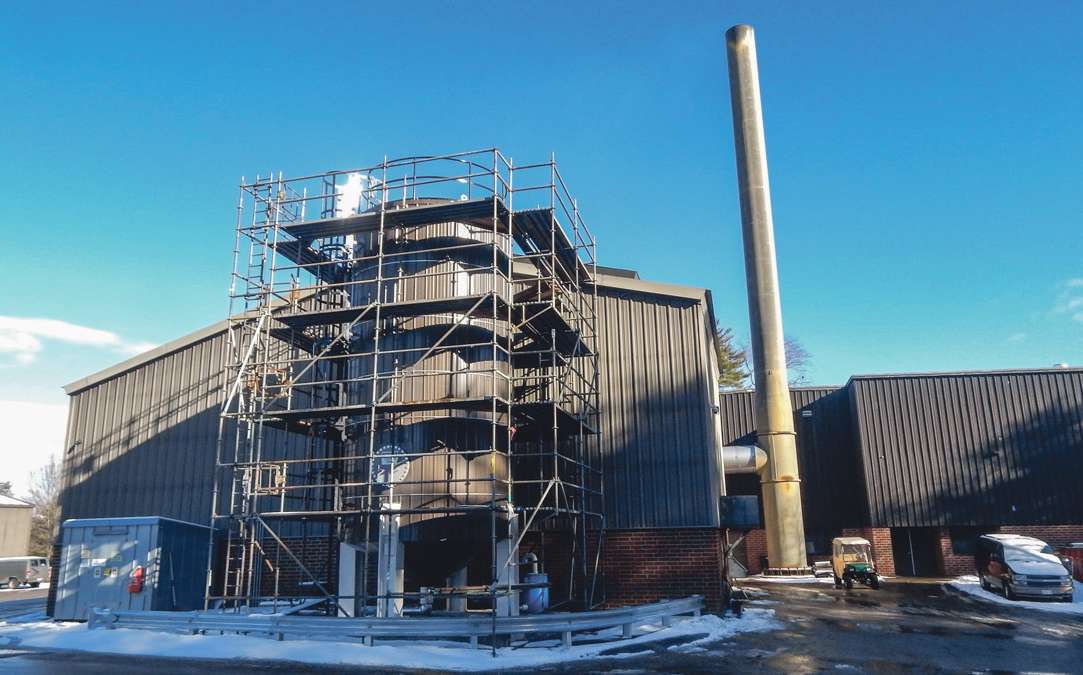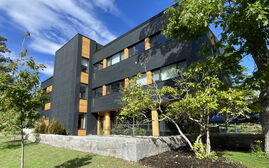
Processing Your Payment
Please do not leave this page until complete. This can take a few moments.
- News
-
Editions
View Digital Editions
Biweekly Issues
- December 1, 2025
- Nov. 17, 2025
- November 03, 2025
- October 20, 2025
- October 6, 2025
- September 22, 2025
- + More
Special Editions
- Lists
- Viewpoints
-
Our Events
Event Info
Award Honorees
- Calendar
- Biz Marketplace
Bates College achieves zero carbon emissions as green ambitions continue
 Photo / Graber Jensen, Bates College
Josie Gillett, Katharine Gaillard, and 180 tomato plants at the Bates College garden, The Plot.
Photo / Graber Jensen, Bates College
Josie Gillett, Katharine Gaillard, and 180 tomato plants at the Bates College garden, The Plot.
Bates College just got to carbon neutrality, but that’s not the end of the road in its efforts to become even greener and leaner in terms of energy efficiency.
On May 16, the Lewiston liberal arts college announced that it had reduced its carbon footprint to zero, a year ahead of its self-imposed 2020 deadline.
Out of 700 schools that signed the American College and University Presidents Climate Commitment in 2007, Bates is one of only seven in the country — four of which are in Maine — that have attained carbon neutrality.
Calling it a historic moment for Bates, President Clayton Spencer tweeted that she’s “thrilled with the result, but I’m even more proud of the fact that we have met this goal through shared effort, commitment and creativity by the entire college community with students leading the way.”
Bates points to its work on three fronts to shrink its carbon footprint: improving energy efficiency; strengthening the sustainability culture on campus and changing behaviors in concrete ways; and switching to renewable energy.
“The one that often gets overlooked, but is closest to my heart, is efficiency,” Bates’ sustainability manager Tom Twist told Mainebiz. “That’s been our silent strength.”
Specific measures include adding insulation to older buildings and technology to adjust the speed of heat pumps and fans to match demand.

Bates claims to be the country’s only educational institution using renewable fuel oil for heat, and Twist says that new fuel and efficiency measures have saved around 25% in costs over the past four years.
“It’s hard to compete with natural gas in terms of pricing,” said Twist, “so finding a low-carbon alternative that’s cheaper is very nice.”
Students are encouraged to help lead sustainability efforts through initiatives like Bates Green Innovation Grants that award up to $2,000 for student projects. It has replaced disposable cups in campus dining with student-issued reusable stainless-steel cups and introduced a student garden that grows food for campus dining and local food banks.
Separately, Bates has further environmental goals in mind.
It is looking for land in the Lewiston-Auburn area on which to install a large-scale solar array and it plans to adopt “aggressive building standards” for renovations and new construction, according to Twist.
Next up is a 65,000-square foot science building, to be finished in 2021, that will be built to Leadership in Energy and Design Silver certification standards.
“The era of brand-new buildings that are energy hogs is coming to a close,” Twist says.
Mainebiz web partners
Related Content

The Giving Guide
The Giving Guide helps nonprofits have the opportunity to showcase and differentiate their organizations so that businesses better understand how they can contribute to a nonprofit’s mission and work.
Learn More
Work for ME
Work for ME is a workforce development tool to help Maine’s employers target Maine’s emerging workforce. Work for ME highlights each industry, its impact on Maine’s economy, the jobs available to entry-level workers, the training and education needed to get a career started.
Learn More
Groundbreaking Maine
Whether you’re a developer, financer, architect, or industry enthusiast, Groundbreaking Maine is crafted to be your go-to source for valuable insights in Maine’s real estate and construction community.
Learn more-
The Giving Guide
The Giving Guide helps nonprofits have the opportunity to showcase and differentiate their organizations so that businesses better understand how they can contribute to a nonprofit’s mission and work.
-
Work for ME
Work for ME is a workforce development tool to help Maine’s employers target Maine’s emerging workforce. Work for ME highlights each industry, its impact on Maine’s economy, the jobs available to entry-level workers, the training and education needed to get a career started.
-
Groundbreaking Maine
Whether you’re a developer, financer, architect, or industry enthusiast, Groundbreaking Maine is crafted to be your go-to source for valuable insights in Maine’s real estate and construction community.
ABOUT
NEW ENGLAND BUSINESS MEDIA SITES
No articles left
Get access now
In order to use this feature, we need some information from you. You can also login or register for a free account.
By clicking submit you are agreeing to our cookie usage and Privacy Policy
Already have an account? Login
Already have an account? Login
Want to create an account? Register
Get access now
In order to use this feature, we need some information from you. You can also login or register for a free account.
By clicking submit you are agreeing to our cookie usage and Privacy Policy
Already have an account? Login
Already have an account? Login
Want to create an account? Register











0 Comments